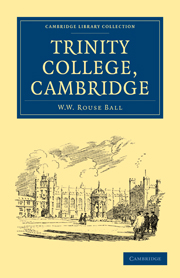Book contents
- Frontmatter
- PREFACE
- Contents
- LIST OF ILLUSTRATIONS
- CHAPTER I THE COURTS AND BUILDINGS
- CHAPTER II SOME INTERIORS
- CHAPTER III KING'S HALL AND MICHAEL-HOUSE, 1316–1546
- CHAPTER IV FOUNDATION AND GROWTH OF TRINITY COLLEGE, I546–1615
- CHAPTER V THE COLLEGE FROM 1615 TO 1820
- CHAPTER VI THE NINETEENTH CENTURY RENAISSANCE
- INDEX
CHAPTER IV - FOUNDATION AND GROWTH OF TRINITY COLLEGE, I546–1615
Published online by Cambridge University Press: 05 August 2011
- Frontmatter
- PREFACE
- Contents
- LIST OF ILLUSTRATIONS
- CHAPTER I THE COURTS AND BUILDINGS
- CHAPTER II SOME INTERIORS
- CHAPTER III KING'S HALL AND MICHAEL-HOUSE, 1316–1546
- CHAPTER IV FOUNDATION AND GROWTH OF TRINITY COLLEGE, I546–1615
- CHAPTER V THE COLLEGE FROM 1615 TO 1820
- CHAPTER VI THE NINETEENTH CENTURY RENAISSANCE
- INDEX
Summary
I LEAVE now the subject of life at King's Hall and Michael-House to turn to the history of the College which succeeded to their buildings. Two days after the surrender of their charters and property, Trinity College was founded by royal charter, December 19, 1546. At the same time Henry pensioned or dismissed the Master and most or all of the Fellows of Michael-House, whilst he appointed Redman, who had been Warden of King's Hall, Master of Trinity, thus definitely linking its life to that of the royal Edwardian foundation. The connection of Trinity with Michael-House is much less intimate. Henry endowed his new College liberally, adding to the belongings of King's Hall and Michael-House property, producing over £1400 a year.
The foundation of the College was contemporaneous with the introduction into the University of new studies and a new system of education, and the College was intended to be a centre for the propagation of the tenets of the reformed faith. Of the sixty original members whom Henry nominated, it is said that all were Protestants; many of these did not act on the nomination, but in 1548, apart from pensioners and fellow-commoners, there were 110 members of the foundation. Under statutes issued in 1552 the number of Fellows was fixed at fifty, of Scholars at sixty, while that of Pensioners was not to exceed fifty-four. It was further ordained that every student should be under a Tutor who was responsible for his instruction.
- Type
- Chapter
- Information
- Trinity College, Cambridge , pp. 49 - 70Publisher: Cambridge University PressPrint publication year: 2010First published in: 1906



